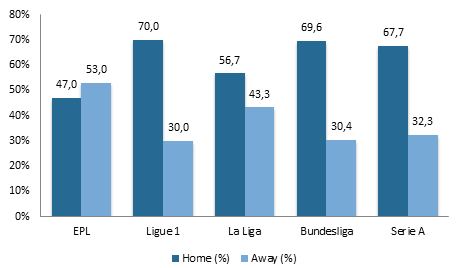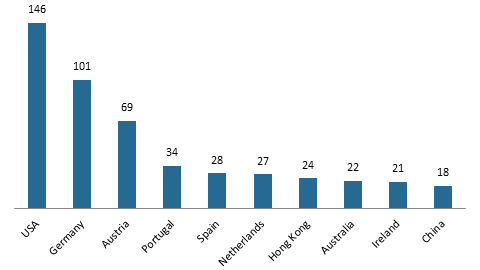Premier League preseason matches have become a global business
China, Japan, Kenya, Los Angeles, Macau, Singapore… Preseason is about to start and the English Premier League is going global again. It is all about money-spinning.
The English Premier League (EPL) plays more matches overseas than any other major league in Europe and most probably the world.
The EPL played preseason games in 42 different countries between 2007 and 2017. The USA, where both Arsenal and Liverpool head this summer, has been the most popular destination. The EPL’s overall exposure in preseason is even larger with matches against clubs from 52 different countries with Bundesliga sides being the most popular opponents.
No other league in Europe is more oversold in terms of international exposure than the EPL. Between 2013 and 2017, 53% of club visits were overseas. In Ligue 1, that ratio is only 30%.
Even Spain’s La Liga, which after agreeing a collective TV rights deal is vigorously competing with the EPL for overseas fans, lags behind the EPL. Just 43% of preseason friendlies by La Liga’s clubs are overseas.
Where the EPL does fall behind not one but two of Europe’s other major leagues is in playing friendlies in neutral locations. Around 37% of EPL friendlies are matches played against clubs from another country in a neutral location.
Given the enthusiasm of leading EPL clubs for lucrative exhibition tournaments such as the International Champions Cup (ICC) in Shanghai, which this summer features Arsenal, Manchester United and Tottenham, that might appear a surprise.
Clubs from the Bundesliga and the Italian Serie A however have a history of going abroad to training camps and playing matches against clubs from another country. French clubs do the same, but often in France.
Figure 1: Preseason games played home/away 2013-2017 (per cent)

EPL clubs have gone abroad to training camps for years. Previously to Spain and Portugal, although both have long since been overtaken.
Last summer, a quarter of the EPL went to Austria, where hotels that rely on winter sport have found a new outlet. Last summer, Austria hosted 287 friendly matches between professional clubs and national teams in less than three months.
Austria’s neighbours Switzerland was once viewed as too expensive but for EPL clubs laden with TV riches, that is no longer a problem. Brighton & Hove Albion F.C, West Ham United and Wolverhampton Wanderers F.C. all went to Switzerland for training camps last summer.
The Big Six: Far away from home
For the Big Six - Manchester City, Tottenham, Arsenal, Manchester United, Liverpool, and Chelsea - preseason trips are more about playing money-spinning exhibition tournaments like the ICC than training camps.
The likes of former EPL coaches Arsene Wenger and Louis van Gaal tried protesting about the impact of tiring preseason trips on their players. The commercial departments at Arsenal, Manchester United and the rest of the Big Six easily won that argument.
Between 2008 and 2017, just 15% of preseason games played by the Big Six clubs were in the UK and against other UK sides. Manchester United only managed four games in the UK in a decade. Last summer, neither Manchester clubs played a single home game in preseason.
The reward for the Big Six is that starting from this season there is a greater share of money from international TV rights than the other 14 Premier League clubs.
For the Big Six clubs, this will undoubtedly be seen as pay-back for all the air miles accrued over the past decade or so. In 2012, the 20 EPL clubs flew 170,000 miles in preseason with Manchester United flying nearly 23,000 miles, Manchester City and Tottenham around 14,000 miles and Chelsea more than 12,000 miles.
No cadre of clubs can match the carbon footprint of the Big Six in preseason. The USA is the favourite destination of the Big Six in preseason but local clubs are rarely involved any more. Only 38% of games played there were against local sides.
This is due chiefly to the influence of ICC promoter Relevent, whose position could be problematic. With an isolationist government in power in the White House, how long will Major League Soccer clubs want to keep sharing or losing fans (and customers) to the EPL?
Figure 2: EPL Preseason matches played overseas 2013-17 – Top 10 countries
 Relevent does involve US sides in its second tier Futures series, but has not invited any MLS sides to the main ICC since 2015.
Relevent does involve US sides in its second tier Futures series, but has not invited any MLS sides to the main ICC since 2015.
This approach has rubbed off on the EPL. At the last edition of the EPL’s biennial Asian Premier League Trophy, in Hong Kong two years ago there were no local sides involved.
This summer’s four-team event in Nanjing and Shanghai again features only EPL clubs in Newcastle, Wolverhampton, Manchester City and West Ham. Like the ICC, no local teams have featured in the Asian Premier League Trophy for four years.
With the help of Relevent, which is part owned by the NFL team Miami Dolphins owner Stephen M. Ross, the EPL has furtively tried to push through the much-loathed concept of Game 39 – an idea of an extra set of games between the teams in the EPL to be played in countries other than England.
Between 2008 and 2017, there have been 25 matches played between EPL clubs in preseason.
Last summer, six EPL clubs – Arsenal, Chelsea, Manchester City, Manchester United and Newcastle – played each other overseas. This summer, Tottenham will play Manchester United in Shanghai in the ICC. There will be another four all EPL matches in the Asia Premier League Trophy in Nanjing and Shanghai.
Clubs follow the money
To some extent, this should not be such a surprise. Top-flight English clubs have always been mercenaries, willing to play games abroad if the money was there.
Liverpool visited Hong Kong back in 1983, when the prize money for the Caltex Cup was $21,000. A year later, the same club went on a lucrative trip to Swaziland after being invited by 16-year-old Crown Prince Mswati, while the aptly titled $200,000 Tournament in Australia attracted Tottenham soon after.
These were ad hoc games but since 2013 Relevant has made the ICC an annual series, while the Asian Premier League Trophy has been around a decade longer and helped EPL clubs capture fans in the Far East.
Relevent are the most successful promoter in recruiting EPL clubs, but there are plenty of other companies looking to use preseason to associate with Premier League sides.
In 2014, Carlsberg persuaded Newcastle and West Ham to take part in the Football United Tour, which brought top-flight English clubs to New Zealand for the first time in 29 years. The trip was timely for Newcastle owner Mike Ashley, who was planning to launch three stores in Australia and New Zealand. Newcastle also sold the TV rights for the six-day tour to 20 countries.
So where will it all end?
There is no need to resurrect Game 39 as that has already been achieved, but the new mid-season break that starts this winter offers yet another commercial opportunity.
The Football Association has warned that the break is not there for clubs to jet off and play money-spinning games, but how long will that position be sustainable?
The timing of the break is just when temperatures have reduced enough to play games in the Middle East, which is increasingly having a greater sway not just in global football politics but also in the Premier League.
The FA has rarely managed to reign in the commercial aspirations of the EPL since it began in 1992. Sooner or later, a big club will test the FA’s resolve over midwinter breaks and there will surely only be one winner.